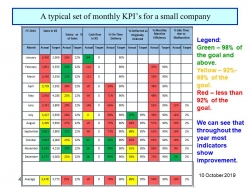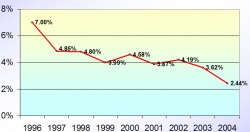In this article I use idea from Dan Ariely's book, Predictably Irrational.
At 6:15 I started riding my bicycle towards Ramat Ha'Nadiv. With me was Yeoshua, and along the way we were joined by Roni and Benny, and we started making our way up to Mansur el-Aqeb. We were supposed to meet Uri there. When we reached the top, there was no sign of Uri. We waited. Uri didn’t arrive, nor call. We tried calling him, and there was no answer. After about fifteen minutes, we started riding again, heading north. A short while later, Uri came riding towards us, smiling. In less than a minute, with no apology, Uri had taken over our little group, and turned us around so we were now riding back south. I didn’t like what was happening, I don’t like it when someone else takes over my plans. I rode with the group, my feelings of unease growing.
I decided I had three options:
Keep riding without enjoying myself,
Convince myself nothing happened, and enjoy the ride,
Ride on my own.
An Irrational Choice and Feeling Good
I chose option three, said goodbye to my friends, turned my bicycle around and resumed riding north. I like riding alone in that area, and I had fun.
So what happened, really?
My decision wasn't rational, but the result was clear: I had a lot of fun riding.
The impetus for my decision was a gut feeling of growing unease. It rose from my need to control my schedule as much as possible, or manage it cooperatively with others. I didn’t like the fact that someone else took over my schedule.
My feeling of unease wasn’t measurable, and neither was my enjoyment after parting ways with the group. Despite this, these feelings had a clear and measurable effect on my actions.
And What if Uri Had Been My Manager or Employer?
Let's pretend Uri was my manager or employer, had asked me to lead the riding group without him, and then met us without prior notice and completely changed the plan I had set with his permission.
Well, I'm sure you're familiar with such a situation from your work life. Your manager comes along and greatly diminishes you. Changes your plans or contradicts the instructions you gave.
My feeling, in such a case, was very bad, but how would I have acted if Uri was my employer? Would I have left the group then too?
How do you act when your manager makes you feel small?
Most employees don’t physically leave the workplace. After all, they need to make a living. But they disengage. They put their head down, stop caring about what goes on around them. Stop feeling motivated.
What is Motivation?
Dan Ariely discusses this question in his book Payoff: The Hidden Logic That Shapes Our Motivations. Quoting the Merriam-Webster Dictionary, he defines motivation as an action or process which give people a reason to do something, or an eagerness to work or do something.
Getting employees engaged and invested isn’t tangible or measurable, but its effect is. Just like my feelings of unease riding with Uri wasn’t tangible or measurable, but the action I took as a result was very tangible.
Can You Create a Sense of Ownership in Your Employees?
The highest level of engagement happens when employees feel ownership, that they have a stake in the company. That's the ideal situation for employees and for the company alike. A win-win situation.
If the idea that employees feel ownership of the company seems ridiculous to you – I'll ask you how you feel when your country wins a medal at the Olympics. Are you not then filled with pride, when your flag is raised, and your national anthem played? That feeling is immediately translated into terms like "we won", and "one of us".
But who is "Us", and why is the winner "Ours"?
Gal Fridman, the Israeli windsurfer who won gold at the 2004 Olympics, grew up and trained near to where I live.
What is the connection between him and me? From where does this sense of ownership comes? If he hadn’t won gold, we would never have even heard of him. But once he competes on "our" national team and wins, we're filled with pride as if he were our child.
If, then, we can feel ownership of our country, and of a previously anonymous man competing under "our flag" – why then can we not feel pride, belonging, and ownership when it comes to the company where we work every day?
Before I discuss ways to create this sense of ownership among your employees, let's first look deeper into the meaning and value of ownership.
What is the Value of Feeling Ownership?
In his book Predictably Irrational, Ariely examines the meaning of the word ownership, and tries to evaluate its worth.
Along with Prof. Ziv Carmon, he tested the sense of ownership among Duke students supporting the university's basketball team. Duke's basketball arena doesn’t have a lot of seats, and students who wanted tickets had to practically camp outside before games. The "privilege" of buying a ticket required a long process, which separated casual fans from die-hard ones. For the important games, you could only get a ticket by joining a raffle to win entry to the game.
After one such raffle, Ariely and Carmon contacted fans who didn’t win a ticket, and those who did. They pretended to try to buy a ticket off of a winner, or sell to those who didn’t win. They contacted over a hundred students.
Ariely summed up the results thus: generally, students who hadn’t won a ticket were willing to pay about 170 dollars (an amount that was determined in comparison with what they'd spend on food and drinks at a sports bar watching the game). Those who had tickets priced them at an average of 2,400 dollars, determining the price according to the importance of the experience for them, and the memories they'll have. Ariely and Carmon didn't find even one case of someone willing to sell at a price someone else was willing to pay.
Rationally, those who had tickets and those who didn’t should have thought about the game the same way. After all, the experience and your enjoyment and memories shouldn’t depend on winning, or losing, a raffle. How could a random raffle change the value of the game so drastically for them?
Ariely explains this gap through ownership. Once raffle winners won a ticket, they felt ownership of it. And we find it difficult to let go of something we own. Ownership, Ariely says, is part of all aspects of life, and strangely effects many things we do.
What Does Ownership Mean for Us?
The sense of ownership is what makes it hard to part with a piece of clothing we haven’t worn in years, furniture we bought, or old work equipment with further no use that's taking up space on the production floor – and it continues to our children's successes, or "our" athletes, or any successful person with whom we can imagine some sort of a connection.
If and when we're able to create in our employees the same sense of ownership of the organization they work in – we'll have employees who are much more willing to contribute (see above the gap between those who won a ticket and felt ownership, and those who didn’t).
But it's not only the organization that profits from employees who feel ownership, the employees themselves profit, and considerably so. They gain a greater sense of meaning in their work and satisfaction in their job. Employees who feel this way will identify with company goals and work to achieve them.
Who Doesn’t Want to Feel Ownership of, and Connected with, Their Workplace?
Y. is a young man, 32 years old, a millennial, programmer writing code at a large software company. He told me he isn't interested in connecting with his company, so that he feels free to leave at any time if he gets a better offer. Out of the "no" we see the "yes". From he's words it becomes clear that he understands that, if he becomes invested in the company's success, he won't be quick to leave whenever a better offer comes along.
That is exactly why every organization should want engaged employees who are invested in company goals, and that can be achieved by creating a sense of ownership.
How to Create a Sense of Ownership and Get Employees Invested in Company Goals?
Pride. People feel ownership of the things that make them proud. So you should share good news and results with your employees. Many CEOs don't share the company's successes with the employees, fearing they'll demand pay raises. This is of course complete nonsense. It's easy to say how mistaken this belief is by looking at publically traded companies, which must publicize their results.
And what if things aren't well? How can you create pride then?
When the company is experiencing problems, share that fact with your employees, and get them to be part of brainstorming and attempts to improve results. Pride will be a product, not of success, but of sharing with the employees and caring for them.
Meaning. The more people feel they're meaningful, the more they'll care about their workplace. People feel meaningful when you share problems with them, and ask for their opinions. When you listen to what they have to say. They might think differently than you, they have different information and different opinions. Some of what they have to say can lead to a turning point for you. They more meaningful they feel, the more meaningful the company is for them, and the more they'll work for its success.
Listening. The more we're listened to, the more meaningful we feel. The more valuable. We feel we contribute more, that we make a difference and create change. These are all the ingredients for feelings of satisfaction and belonging in the workplace, and from that, the desire to contribute to the company.
Autonomy. We all want to feel independent and that we have space for autonomy. The more employees have personal responsibility and independence – within clear boundaries of instructions, goals, and responsibilities – the more they'll feel satisfied and meaningful in their workplace.
The desire for independence isn’t confined to employees. We all want to feel we have autonomy. Even the CEO is sometimes a puppet and has to act according to what the directors or owners dictate, with very little room to maneuver.
Transparency. The more you share information with your employees and are transparent with them, the more engaged and invested they'll be.
Fairness. When employees feel they're treated unfairly, they become angry and resentful towards the company, and as a result, also disengaged. And likewise the other way around, feeling that they're treated fairly makes employees more invested in the company. The emphasis here is on employees' feelings. Fairness is a subjective feeling, but it's effect is strong. Despite it being subjective – it is still management's responsibility to promote it.
Mutual respect. Like the above, when employees feel they're treated with respect, it has an important effect on their attitudes and feelings towards the company.
People Are Different, So the Task Is Complex
Let's return for a moment to my personal story at the begging of this article. I remind you that of the group, I was the only one who felt uncomfortable and decided to ride alone. My friends accepted the change in route, or maybe even welcomed it.
That's how people are – different from one another. That's why the task of creating a sense of ownership among employees, getting them engaged and invested, getting them to feel meaningful – is such a complex one.
But despite that, it is management's responsibility to deal with the complexity, and get employees engaged, invested, and feeling meaningful. The achievement is a win-win situation, benefiting everybody, but it's the management's job to set the tone.
Summary and Recommendations
Fostering a sense of belonging and ownership in your employees is the best way to create motivation, get employees invested in company goals, and install in them a feeling of meaningful work. The same way we feel our country is ours, as well as all its heroes-for-the-moment – noble prize winners, gold-winning athletes, renowned artists - so can a workplace be "ours". If a workplace is "mine", I'll have pride in it. I'll want to contribute more, I'll be motivated to work for its success.
Ownership and belonging are the opposite of alienation. An alienated employee makes no effort to do anything past what is seen or monitored by management. The employee's manager, in turn, feels alienated too.
For this reason, it's important you promote among your employees a sense of ownership.
Focused and Fast Coaching and Consulting Services for CEOs and Companies during the Coronavirus Crisis
The Business Excellence team can help you build, within 2-4 working days, a plan to survive this financial crisis, or to achieve your goals.
We can help you to do the following:
Build a plan to handle this crisis, and couch you through it.
Identify possible threats to your company and come up with a plan to approach them.
Implement and manage work-from-home practices.
Identify and maximize the opportunities (!) presented by the crisis.
Our experts have a wide and diverse experience of over 100 years combined managing companies and consulting to CEOs – so we will be able to identify the unique needs of each company, and find the safest and fastest way for you to approach the new challenges presented by the crisis, and to ensure your company’s resilience.
If you are interested in my professional help, personally or for your company, the best way to contact me is to send a request through the Get in Touch form here.
Related Articles
- How to Cope with Employee Absenteeism
- How to Create and Measure Employee Motivation
- Is There a Link Between Salary and Motivation?
- How Do We Build Employee Motivation?
- About Worker Motivation and Increased Production
- Old Kibbutz Values Have Been Revived in Leading Global Companies
- On the Power of Fairness in Generating Employee Motivation
- Fat Cats: On Fairness and Its Effect on Motivation and Output
- Every Time You Yelled at Me, I Peed in Your Soup
- My Door Is Always Open, Or, the Power of Transparency












 My First Book: Manage! Best Value Practices for Effective Management
My First Book: Manage! Best Value Practices for Effective Management